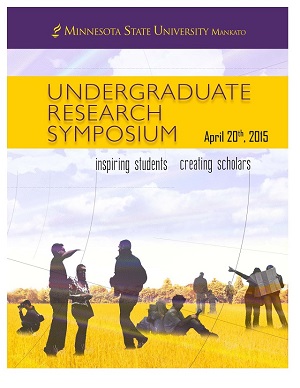Expression of a Potential Novel Deafness Gene
Location
CSU Ballroom
Start Date
20-4-2015 10:00 AM
End Date
20-4-2015 11:30 AM
Student's Major
Biological Sciences
Student's College
Science, Engineering and Technology
Mentor's Name
David Sharlin
Mentor's Email Address
david.sharlin@mnsu.edu
Mentor's Department
Biological Sciences
Mentor's College
Science, Engineering and Technology
Description
Over fifty percent of hearing loss is the result of genomic defects. Thyroid hormone plays a key role in developing the auditory organ, known as the cochlea, by regulating gene expression. A lack of this hormone during crucial periods of perinatal development leads to permanent hearing loss due to altered remodeling of the greater epithelial ridge, a transient structure that generates the tectorial membrane. However, the molecular mechanisms that the thyroid hormone regulates to direct the development of hearing are poorly understood. This project focuses on a novel potential thyroid hormone target gene, carbohydrate sulfotransferase 15 (chst15), which codes for an important enzyme involved in the sulfonation of glycoproteins in the tectorial membrane. The goal of this project is to determine the expression profile of chst15 during normal euthyroid cochlear development and determine how this expression changes in developmentally hypothyroid C57Bl/6 mice. Cochlea from control and hypothyroid mice were harvested at postnatal days 1, 5, 8, and 15, frozen, and cryosectioned. To locate the specific chst15 mRNAs within the cochlea, in situ hybridization, a process that uses anti-sense (complementary) labeled mRNA that can be detected with an enzyme-conjugated antibody for chromagen detection was used. Future studies will be aimed at detection Chst15 protein via immunohistochemistry (IHC). Together, these studies will demonstrate misregulation of Chst15 under hypothyroid conditions and document that mRNA molecules are translated into protein.
Expression of a Potential Novel Deafness Gene
CSU Ballroom
Over fifty percent of hearing loss is the result of genomic defects. Thyroid hormone plays a key role in developing the auditory organ, known as the cochlea, by regulating gene expression. A lack of this hormone during crucial periods of perinatal development leads to permanent hearing loss due to altered remodeling of the greater epithelial ridge, a transient structure that generates the tectorial membrane. However, the molecular mechanisms that the thyroid hormone regulates to direct the development of hearing are poorly understood. This project focuses on a novel potential thyroid hormone target gene, carbohydrate sulfotransferase 15 (chst15), which codes for an important enzyme involved in the sulfonation of glycoproteins in the tectorial membrane. The goal of this project is to determine the expression profile of chst15 during normal euthyroid cochlear development and determine how this expression changes in developmentally hypothyroid C57Bl/6 mice. Cochlea from control and hypothyroid mice were harvested at postnatal days 1, 5, 8, and 15, frozen, and cryosectioned. To locate the specific chst15 mRNAs within the cochlea, in situ hybridization, a process that uses anti-sense (complementary) labeled mRNA that can be detected with an enzyme-conjugated antibody for chromagen detection was used. Future studies will be aimed at detection Chst15 protein via immunohistochemistry (IHC). Together, these studies will demonstrate misregulation of Chst15 under hypothyroid conditions and document that mRNA molecules are translated into protein.
Recommended Citation
Verdon, Jonathan. "Expression of a Potential Novel Deafness Gene." Undergraduate Research Symposium, Mankato, MN, April 20, 2015.
https://cornerstone.lib.mnsu.edu/urs/2015/poster_session_A/23




